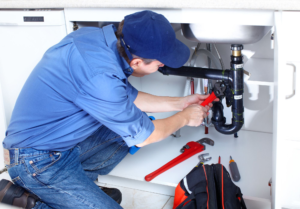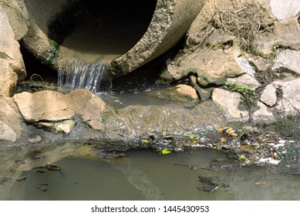Plumbers Lexington install, repair, and maintain pipes and fixtures that supply water and carry waste away in homes and businesses. They read blueprints and building codes to plan plumbing installations and use specialized tools to inspect and diagnose problems with existing systems.
Plumbers’ work hazards include exposure to hazardous materials and physical injury from tools, especially when working in large or confined spaces. They also face potential risks from infectious diseases when handling sewage or other biohazards.

Plumbers install the pipes that carry water and waste throughout homes, businesses, and industrial facilities. They may install bathtubs, showers, sinks, toilets, and other plumbing fixtures; connect appliances to water supply and drainage lines; and inspect, test, and maintain plumbing systems. Plumbers also collaborate with construction teams and architects to integrate plumbing into new building projects seamlessly.
Some plumbers specialize in residential, commercial, or industrial work. Licensed residential plumbers typically focus on installations in single-family homes. These may include replacing or repairing faucets, toilets, and water heaters; re-piping homes; and installing garbage disposals and whole-house water filtration systems. Licensed residential plumbers also install and repair septic systems and yard sumps.
Commercial plumbers focus on plumbing systems in larger buildings, such as offices, retail stores, restaurants, hospitals, and manufacturing plants. These larger plumbing systems serve many more people at once than residential systems, and they require more maintenance due to greater use and wear. Additionally, commercial plumbers often handle specialized plumbing equipment such as steam boilers and large-scale water heaters.
Service and repair plumbers respond to customer calls regarding leaks, clogs, or other problems with their plumbing fixtures. These plumbers use their knowledge of plumbing codes and regulations to troubleshoot and fix these issues. They also educate customers on plumbing best practices.
Sanitary plumbers diagnose and repair sewage system issues, such as leaks, blockages, and other problems that affect a home’s septic or sewer systems. They may use special tools to remove obstructions from drains and pipes, and they often work on large-scale piping systems in both residential and commercial settings.
Some plumbers have a background in engineering, physics, or another technical field before entering the trade. Others learn on the job through apprenticeships or vocational programs at a community college or technical school. In some states, a high school diploma is enough to qualify for an apprenticeship. Plumbers who wish to become licensed must pass a state exam. Those with a license may earn more through independent contracting or starting their plumbing businesses.
Repair
Plumbers repair water, drainage, and gas systems in homes and businesses. They also install plumbing fixtures and appliances such as bathtubs, toilets, sinks, and faucets. They may also repair or maintain septic systems and garbage disposal units. The state must license plumbers who specialize in gas work.
Some plumbing repairs are urgent and require emergency services. These include clogged drains, overflowing toilets, and burst pipes. Plumbers who provide emergency services often charge higher rates than their counterparts because they must cover costs such as overtime and travel expenses.
Other common plumbing repairs are leaking faucets, faulty showerheads and hoses, and dripping water heaters. Plumbers usually use a variety of tools to perform these repairs, including pipe cutters and wrenches, electric drills, and hand tools. They may also use digital cameras to inspect and diagnose problems.
When it comes to repairing pipes, plumbers must take into account the type of pipe, its location in the house, and how severe the leak is. For instance, a cracked pipe in the basement may be more difficult to repair than one in the attic. Plumbers may also need to replace entire sections of a pipe if the damage is too severe.
The quality of a home’s water can be improved by installing a plumbing filter. However, the filter must be cleaned regularly to ensure that it continues working properly. If the quality of a home’s water is poor, it can lead to health issues. Plumbers can help fix these issues by assessing the water quality, testing the flow rate of the water, and fixing any faulty fixtures.
Plumbing repairs can be costly, but they are necessary to maintain a safe and functional household. Most homeowners attempt to repair minor plumbing issues themselves, but this is rarely effective. For example, when attempting to remove a clog, they may break a pipe and cause even more damage. In addition, DIY fixes are typically temporary solutions. Hiring a professional plumber to handle the issue right away is a more cost-effective and long-term solution. It will prevent future damage, save time, and give the homeowner peace of mind.
Maintenance
Many people don’t think about their plumbing systems until something goes wrong, but regular maintenance can prevent large problems down the line. Plumbers can check for leaks, loose fixtures, or clogged drains and repair them before they become serious issues. They can also inspect a home’s gas lines to ensure they are safe and working properly.
A high school diploma or equivalent is typically the minimum educational requirement to start a career as a plumber. However, some plumbers pursue post-secondary education at a technical or trade school to improve their skills and expand their knowledge base. These programs often include classroom instruction and hands-on training with real-world projects. In addition, they can provide students with the opportunity to network with other professionals in the industry.
After completing their education or apprenticeship, plumbers must pass an exam to receive their license. This process varies by jurisdiction, but it usually involves demonstrating knowledge of plumbing codes and regulations, safety practices, and the ability to read blueprints. Some plumbers choose to pursue additional certifications in specific areas of expertise, such as working with water heaters or installing medical gas systems.
Plumbing is a physically demanding job that requires strong physical stamina and manual dexterity. Plumbers frequently lift and carry heavy tools, work in tight spaces, and spend long periods of time on their feet. They also need to be able to solve complex problems quickly and accurately.
Plumbers must be comfortable communicating with customers and explaining their work. They need to listen carefully to customer concerns and explain the costs and benefits of different solutions. They also need to have excellent troubleshooting skills, as they may encounter unexpected challenges while working on a project. This could include finding a new way to connect two pieces of pipe or fixing an issue that wasn’t originally intended by the engineer. These skills can help them save time and money for their customers. They also help them build trust with their clients and keep them coming back for future services.
Inspection
Plumbing inspectors assess the condition of plumbing systems to spot problems that can lead to clogs, water leaks, or even system failure. They use specialized tools to inspect pipes and fixtures such as toilets, faucets, drains, water heaters, and more. They also review blueprints and building codes to ensure plumbing components are placed accurately and connected correctly.
A plumbing inspection can help prevent expensive repairs in the future. If a plumber finds a small issue, such as an inadequate slope in waste drain lines or excessive sediment buildup, they can correct it before it becomes a larger problem that requires more extensive work. This is particularly important for older homes that may have lead pipes.
During an inspection, a licensed plumber will look at the condition of exposed pipes, water valves, and caulking to ensure they are in good shape. They will also check for scalding hot and cold water, ensuring the maximum temperature is set properly to avoid scalding injuries. In addition, they will inspect garbage disposals and dishwashers to ensure proper functioning and safety.
Other parts of a plumbing inspection include examining the water supply and sewage lines to ensure they are in good repair and are not leaking or clogged. This can be done visually or with the use of video equipment. The plumber will note any issues found, their location in the plumbing system, and their severity. They will then provide recommendations for repairs or replacements.
Plumbing inspections are a vital part of owning a home or commercial property. They can catch small problems before they become a major issue, saving you time and money in the long run. In addition, they can provide you with valuable information if you are considering purchasing a property, so you can negotiate the necessary repairs into the selling price or ask for credits from the seller. Contact a licensed plumber to learn more about their services or to schedule an inspection.
